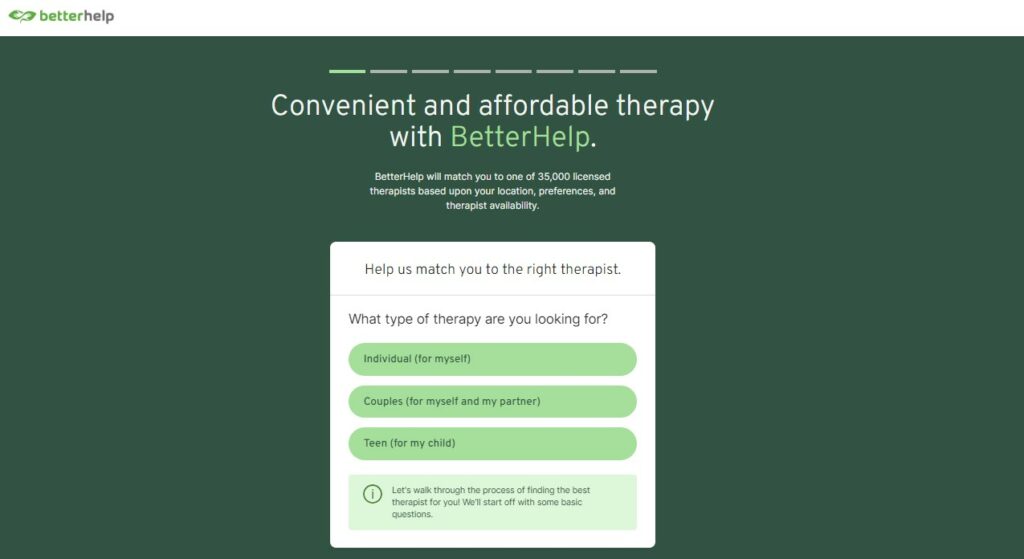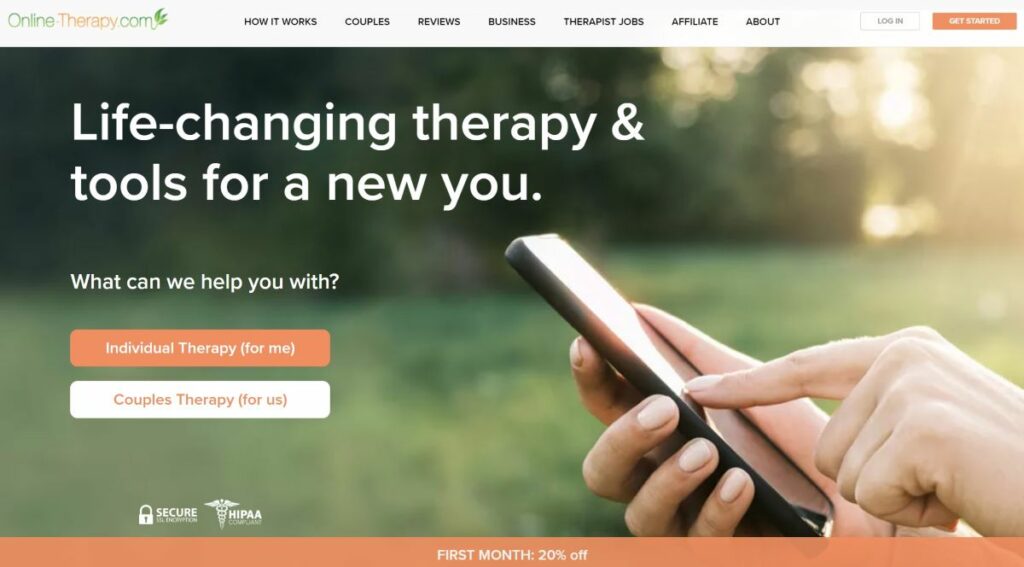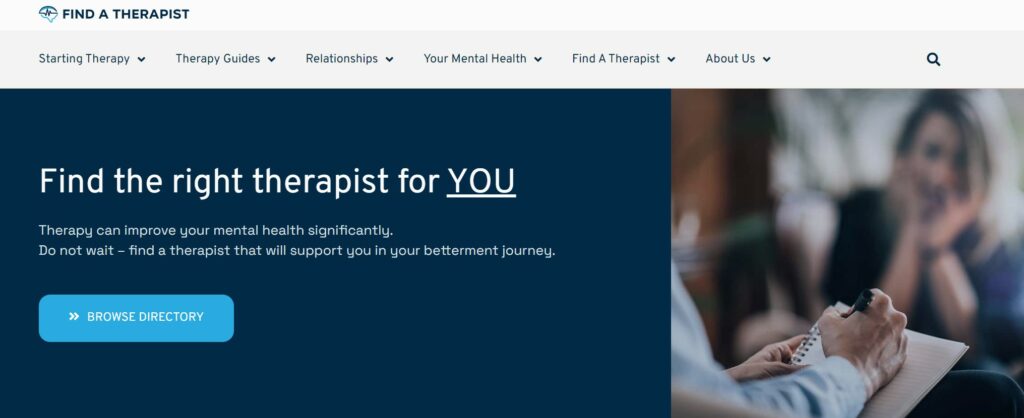Childhood trauma refers to adverse childhood events that result in anxiety, depression, flashbacks, nightmares, or other psychological symptoms.
Common types of childhood trauma include childhood neglect, sexual exploitation, the loss of a parent, and bullying, among others.
In this guide, we’ve explained how to find a therapist who has experience in helping people overcome serious childhood trauma. We’ve also explained what to expect when seeing a counselor to help overcome trauma in your childhood.
Want to skip right to the suggestions for childhood trauma therapists? Here are our 6 recommended therapy solutions:
Childhood trauma therapists
Considering sometimes it’s challenging to find a therapist nearby due to the geographical location, below, we’ve looked at six places you can find a licensed, qualified childhood trauma therapist both online and in-person.
| Provider | Good For | Location | Pricing |
|---|---|---|---|
| BetterHelp | Quick match with the right therapist four you | Online therapy | $65 to $90 per week (billed every 4 weeks) |
| Online-therapy.com | Finding licensed and experienced therapists with a Cognitive Behavioral Therapy (CBT) approach | Online therapy | $40/week to $88/week (including our 20% discount first month) |
| Calmerry | Depression therapy, online grief counseling, anxiety therapy, therapy for OCD, self-esteem therapy | Online therapy | $49.50 to $73.75 per week (billed monthly) |
| TalkSpace | Depression, anxiety, bipolar disorder, OCD, PTSD, LGBTQIA+ therapy | Online therapy | Varies according to insurance coverage or self-pay options |
| Find-a-therapist.com | Finding and contacting the right therapist for you | Online and in-person therapy | Varies depending on the counselor fee |
| ISTSS Directory | Finding and contacting the right therapist for you | Online therapy and in-person therapy | Varies depending on the counselor fee |
1. BetterHelp

Explore emotional well-being with BetterHelp – your partner in affordable online therapy. With 30,000+ licensed therapists and plans starting from only $65 per week, BetterHelp makes self-care accessible to all. Complete the questionnaire to match with the right therapist.
- Good for: Quick match with the right therapist four you.
- Location: Online therapy.
- Pricing: $65 to $90 per week (billed every 4 weeks).
- Features: iOS and Android app available, message your therapist anytime, live sessions are scheduled weekly and done via live chat, phone, or video call.
BetterHelp is an online platform where you can easily access the services of qualified, experienced mental health professionals. Using this service, you can connect with a licensed therapist who has extensive experience in helping people overcome childhood trauma, as well as any symptoms of your trauma, such as post-traumatic stress disorder.
Read our BetterHelp review here.
2. Online-therapy.com

Discover transformative online therapy with Online-therapy.com. Through cognitive behavioral therapy (CBT), Online-therapy.com offers individual and couples support starting at $45/week. Engage in sessions via video, voice, or text for maximum flexibility. Fill out their online questionnaire to get started.
- Good for: Finding licensed and experienced therapists with a Cognitive Behavioral Therapy (CBT) approach.
- Location: Online therapy.
- Pricing: $40/week to $88/week (including our 20% discount first month).
- Features: Unlimited messaging with your therapist, including a daily journal and activity plan, yoga and meditation videos, and tests to see your progress.
Online-therapy.com is a platform that connects you automatically with licensed therapists who have a Cognitive Behavioral Therapy approach, which is very effective in addressing trauma.
Read our online-therapy.com review here.
3. Calmerry

Embark on a journey of mental wellness with Calmerry. With diverse subscription options, starting at just $50, Calmerry makes prioritizing your mental health simple and accessible. You can message your therapist any day or schedule a live therapy session from the comfort of your home from any device.
- Good for: Depression therapy, online grief counseling, anxiety therapy, therapy for OCD, self-esteem therapy.
- Location: Online therapy.
- Pricing: $49.50 to $73.75 per week (billed monthly).
- Features: Message to your counselor anytime, text therapy and video therapy according to the plan you choose, free counselor switching.
Calmerry has a comprehensive network of therapists and counselors with experience in different issues, including childhood trauma. In this platform, you will be matched with the right therapist according to your needs.
Read our comparison between Calmerry and BetterHelp here.
4. TalkSpace

Tailored to individuals, couples, teens, and offering psychiatry services, Talkspace plans kick off at a wallet-friendly $69 per week. What’s more, many health insurances also cover their services, enhancing accessibility and affordability. Complete a questionnaire and get matched with the right therapist for you.
- Good for: Depression, anxiety, bipolar disorder, OCD, PTSD, LGBTQIA+ therapy.
- Location: Online therapy.
- Pricing: Varies according to insurance coverage or self-pay options.
- Features: Accepts insurance, pick your therapist from a list of recommendations, live video sessions and unlimited messaging with your therapist, medication management.
TalkSpace offers you a list of therapists experienced in childhood trauma after a little questionnaire. Then, you can select the therapist you like the most and start therapy after reviewing the profiles.
Read our TalkSpace review here.
5. Find-a-therapist.com

- Good for: Finding and contacting the right therapist for you.
- Location: Online and in-person therapy.
- Pricing: Varies depending on the counselor fee.
- Features: Filter your search, find accessible and effective online and in-person therapy, find guides on different types of therapy.
On Find-a-therapist.com you can personalize your search to find the right therapist for you. There, you can find therapists with experience and training in addressing trauma, including childhood trauma, such as Jane Perkins.
5. ISTSS Directory

- Good for: Finding and contacting the right therapist for you.
- Location: Online therapy and in-person therapy.
- Pricing: Varies depending on the counselor fee.
- Features: Online directory, use the filters available to narrow down your search results, contact the therapist you choose directly.
The International Society for Traumatic Stress Studies (ISTSS) has an online directory where you can easily locate a therapist qualified to help with childhood psychological trauma. You can select your preferences in a therapist. For childhood mental trauma, you may select PTSD (post-traumatic stress disorder), “Harassment in childhood”, or any other issues you’re facing.
What is Childhood Trauma?

As defined by the National Institute of Mental Health, any event or situation a child experiences that is distressful or emotionally painful, which may lead to mental or physical effects, can be described as childhood trauma.
These painful events may include physical or sexual abuse, emotional abuse, witnessing domestic violence, the loss of a loved one, physical or emotional neglect, or any other traumatic events.
Symptoms
Childhood trauma presents different symptoms that may vary from person to person. Moreover, childhood trauma symptoms also depend on the age of the individual.
Below, we’ve looked at some common symptoms of childhood trauma. This is not an exhaustive list – there are other symptoms that sometimes occur which are not listed here.
a) Childhood Trauma in Preschool and Elementary-age Children
- Excessive crying and acting out
- Separation anxiety
- Nightmares and difficulty sleeping
- Decreased academic performance
- Excessive mood swings and aggressive behavior
b) Childhood Trauma in Teens
- Difficulty concentrating
- Feelings of guilt and shame
- Self-harming behaviors
- Increased negative thoughts
- Hyperactivity and risky sexual behaviors
- Irritability and isolation from social peers or family
c) Childhood Trauma in Adults
Left untreated, childhood trauma may lead to many different types of mental health problems in adulthood. These may include post-traumatic stress disorder (PTSD), psychosis, emotional imbalances, depression, attachment disorders, and an inability to manage stressful situations, amongst other issues.
How Common is Childhood Trauma?
If you have faced traumatic events in your childhood, it’s important to keep in mind that you’re not alone.
According to the Substance Abuse and Mental Health Services Administration (SAMHSA), almost two-thirds of children have experienced at least one traumatic event before the age of 16.
This statistic clearly indicates that this isn’t a rare issue – most people have faced childhood trauma. However, the trauma we’ve experienced may remain hidden from the conscious mind, and does not always significantly affect our mental health in the long term.
When childhood trauma does affect your mental health, it can be very beneficial to seek help from a licensed therapist.
How Can Childhood Trauma Therapists Help?

Childhood trauma therapists can help alleviate the symptoms of negative past events and reduce the further impact that childhood trauma has on your mental health and wellbeing.
First of all, a trauma therapist typically explores the symptoms of trauma, the severity of the trauma, and its effects on your mental health. After exploring these different aspects, a therapist may devise a therapeutic strategy to cope with the trauma. We have explored some of the common psychotherapeutic techniques used to help manage trauma in the next section.
Ideally, your therapist will also follow up with your progress after completing a course of therapy, to help ensure that the treatment was successful, and your symptoms have subsided.
Therapies Used
Mental health professionals may use a range of different psychological therapies to help resolve childhood trauma issues. These types of therapies include:
a) Cognitive-Behavioral Therapy (CBT)
Cognitive-Behavioral Therapy is focused on changing negative behaviors, thoughts, ideas, and perceptions related to past trauma. A trauma therapist will explore unwanted and painful thoughts associated with childhood trauma during CBT.
After identifying these unwanted thoughts and ideas, a therapist usually tries to replace these negative thoughts with positive and helpful ones.
CBT is often used to treat the effects of childhood trauma that appear in your teenage years, or in adulthood. This type of therapy is less effective at helping children to overcome trauma symptoms, except where specific steps are taken to adapt the treatment process, such as with trauma-focused CBT, which we have explored below.
b) Trauma-focused CBT
Trauma-focused CBT, a subtype of Cognitive-Behavioral Therapy, is mainly used by therapists to help children and adolescents manage childhood trauma. In trauma-focused CBT, a therapist will provide trauma-sensitive interventions, and will also use cognitive-behavioral techniques.
Before processing the trauma, a therapist focuses on providing psychoeducation, relaxation, and cognitive skills to help you cope with trauma symptoms. In this way, a child’s mental health is safeguarded before beginning to manage their symptoms using CBT techniques.
c) Eye Movement Desensitization and Reprocessing (EMDR) Therapy

EMDR is a type of psychotherapy that can help you heal from symptoms of traumatic events, including traumatic memories, anxiety, and depression.
During EMDR, a therapist might ask you to recall memories of past trauma while using bilateral stimulation in the form of eye movements or finger tapping. This type of therapy can help desensitize you to your traumatic experiences, and consequently, in the future, you may recall certain traumatic experiences without the occurrence of unwanted symptoms, such as anxiety.
d) Narrative Exposure Therapy (NET)
Narrative exposure therapy is another type of treatment used to alleviate the symptoms of childhood trauma. With this type of therapy, you may be asked to narrate the story of your life experiences, including both negative and positive events.
The primary focus of a therapist in providing NET is active listening and positive feedback. During the narration of past events, a therapist may ask you to use a symbol (such as flowers or a stone) when narrating a certain past incident. You may select the symbol according to your emotional response to that incident. For example, flowers might represent good moments, while stones represent traumatic experiences. Thus, your timeline of different life events is annotated with flowers or stones.
Next, the therapist may work on the different traumas you’ve experienced in your life, represented by stone symbols in the timeline. Lastly, the therapist may also provide you with a complete timeline of events to study the trauma you have faced, your emotional responses to those events, and how you overcame these childhood traumatic experiences.
NET is mostly preferred when you have gone through multiple traumatic events instead of just one, because it provides a timeline of events in chronological order. In this way, it becomes easier to resolve complex childhood traumas collectively.
e) Dialectical Behavior Therapy (DBT)
Using techniques such as CBT and mindfulness, dialectical behavioral therapy is mainly used to prevent self-harm and help patients learn skills that can be used to manage painful emotions or memories associated with trauma.
In DBT, the main focus of therapy is acceptance of painful experiences, and then goal orientation to achieve a behavioral modification through a step-by-step process. A therapist may help you recognize your negative inner thoughts about past traumas and then devise a therapeutic plan for behavioral change. This behavioral modification is designed to result in a desensitization to past trauma.
f) Prolonged Exposure Therapy
Prolonged exposure therapy is designed to desensitize individuals to traumatic memories and painful emotions associated with past traumas. In prolonged exposure therapy, you may be asked to tell the story related to the traumatic incident again and again.
Sometimes, negative responses to traumatic events occur because you avoid talking about or remembering your trauma. Talking about the trauma repeatedly can help you work through the pain, and come to accept what occurred. In this way, you may eventually be able to avoid experiencing painful emotions when thinking about the trauma you have faced.
f) Art Therapy

Art therapy is another good way to resolve childhood trauma issues. As children are usually less verbally expressive, art therapy provides an alternative medium to express painful experiences or previous traumas, but art therapy is also very effective for adults as well.
In art therapy, you may be asked by the art therapist to express your painful emotions through different creative expressions. This may include poetry, painting, music, sculpturing, and other art forms you can use to express your inner thoughts.
g) Others
Childhood trauma therapists are not restricted only to using the therapies mentioned above, especially when working with children, rather than adults. They may also use a range of other therapies to resolve mental health issues associated with childhood trauma, such as school-wide interventions, attachment and competency frameworks, or play therapy.
Benefits of Childhood Trauma Therapy
There are many benefits associated with childhood trauma therapies for those suffering from trauma symptoms, such as PTSD. Some of these benefits are explained below.
a) Psychoeducation Through Therapy
You will learn more details about your mental health condition through childhood trauma therapy. During this process, a therapist may inform you about the effects of traumatic experiences on your mental and emotional health, and ways to mitigate their effects. They may also discuss different strategies to cope with these issues.
Therapy can be an opportunity to discover the answers to certain questions regarding your thoughts, ideas, or behaviors you consider unbearable, or which are associated with past traumas.
b) Identification of Triggers
Childhood trauma occurs when we are still developing, and as a result, it is not always an easy task to identify the triggers of symptoms. Often, it is quite hard to find the exact triggers that may aggravate the symptoms of childhood trauma.
A trauma therapist may explore different triggers through these therapies, identify the aggravating factors, and then inform you about their findings. This information can be especially helpful as you and your therapist formulate a plan to help overcome these triggers.
c) Development of Coping Skills

Childhood trauma therapy provides an opportunity to learn healthy coping skills – essential to managing the issues precipitated by childhood traumas. These skills may include anger management, stress reduction skills, relaxation techniques, and many others.
These skills can also help you cope with life’s challenges more broadly, as they equip an individual with a greater sense of resilience and a stronger response to negative events they may face.
d) Reduction in Traumatic Stress Symptoms
Overall, the main purpose of childhood trauma therapy is to reduce traumatic stress symptoms. Using different psychotherapeutic techniques, a trauma therapist may help you to overcome anxiety, depression, shame or guilt, nightmares, and other symptoms associated with childhood trauma.
Conclusion
Childhood trauma therapists play a pivotal role in providing essential support and healing for individuals who have experienced adverse childhood experiences. By employing evidence-based therapeutic approaches, such as trauma-focused therapies, they assist individuals in developing coping strategies, fostering resilience, and re-establishing a sense of safety and self-worth.
Still not sure how best to find a therapist to help with childhood trauma? Feel free to contact us, and we’ll get back to you.





